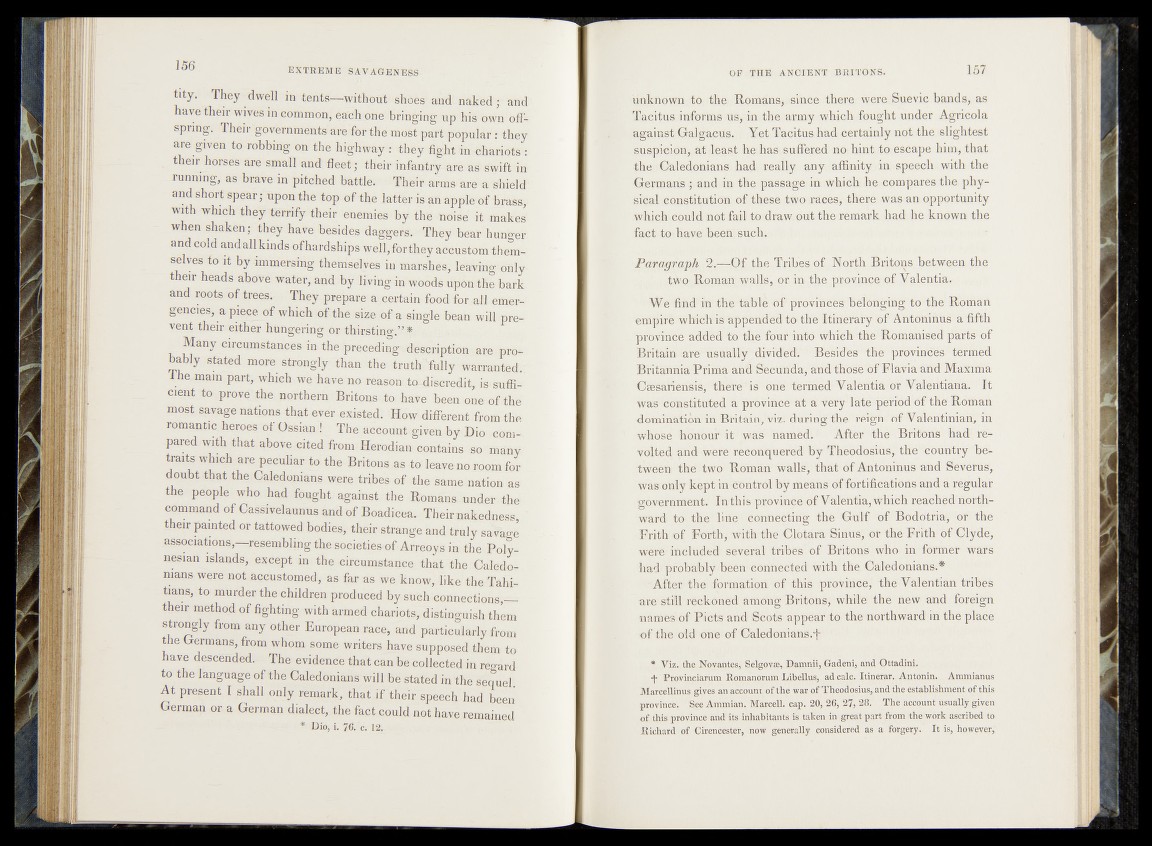
tity. They dwell in tents—without- shoes ahd naked ; and
have their wives in common^ Cbc'h one bringingr-iip hi's bwn off*
spiing. Then- governments are for the most part popular: they
are given to-robbing on the highway : theyfight in chariots-
their horses are small and/fl&fc; their infantry are aSAsWift in
running, as brave in pitched battle. Their arm's* are a «shield'
and short spear; upon the top of th e ia tte r is an applnofbrassf
with which they terrify their enemies« by the hoisW it makes
when shaken; they have besides daggers. T h e f b ^ l iu n g e r
andeold andall kinds ofhardships w% fb r they acciistom them^
selves to it by immersing themselves iu marshes, leaving; only
AeiT-heads above water, and h y living in wood& ilf iih ^ ih a rk
and roots, of .trees. They prepare a certain,“ fobdfor,all effiergencres,
a piece of which of the size of a single bean willipr-e-
fent their either hungering or thhstin»;’’*
I ®J^5Wcumstanees in the^p reeed iH g ^scrip tio n ^ te^ro t
bably stated more strongly than the, truth'Yuliy«warranted.;
t he. main part, which we have no reason .ta -d ^ e fe i|^ s ts u ii-
cient to prove'the northern Britons,to have been ,on& of-thh
most savage nations that over existed. How-different from t% -
romantic.-heroes of Ossian ! The account given by B H B B
pared with that above cited from Herodian contains^© -tnianv
tr a i^ which are. peculiar to the Britons as to leavemorpdom&r
doubt that the Caledonians were tribes o f the same n a t io n s
the people who hadYpnght against the Rbmhns. under Athe-
command of Gassivelaunus and of Boadfcbiu T h e in a a * e d i^ i >
their painted or tattowed bodies, their strange and truly saVage
associations, resembling the societiesof Arrebysin the Pojv-
nesian islands, except in the circumstance that the Caledoi
mans were not accustomed, as far as we know, like the Tahitians,
:to murder the children produced b y sucffconnections^
their method of fighting with armed chariots, distinguish them
strongiy from any other European race, and particularly from
the Germans, from whom, some writers Jmve supposed them to
have descended; The evidence that can be collected in regard
to the iangUafge'-bf the Caledonians will be stated in the sequel.
At present I shalhonly remark, th a fa f their speech had been
German o r a German dialect, the fact could not have remained
* D% i. 7’G. c. 12.-.'
unknown to the- Romansp'since there were.Suevic bands, as
Tacitus, informs us, inltfefe army;which>fbught under Agricola
- against, Qalgacia:|t..(i' Yet Tacitus had certainly not the slightest
suspicj,©n,,;at Ig^pthe has suffered no-hint to escape him, that
th eil-Qal edoni ans had 'really any affinity ,in speech with the
Germans. ;«and vin the passage) in which he, compares the physical
constitution of these tw o ra ces, <$bie was an opportunity
whidhte$uld not fai|« tp draw, out the remark hadvhe known the
fact to haveheehfsuch.
Paragraphlk%^&£r the Tribes o^|h3 4tp^s between the
5, i^q^Roman y or. in alentia.
We find i*n the tabIe='of provih’te'e^^Kiififf^to the Roman
empire wbich^iWappendeffto the Itinefad^ of Antoninus a fifth
pfb\iV/(5e ddde'cr k o 1 theTouf1 into which th e 1 Romanised parts of
^ rita irt^ lb ^ dM -ly ^ d i^ id e i^ B ^ t e s the* provihc^s^ termed
Britatania'Prima ana ^clq^da, and thblf^T Flavi a and Maxima
'- C i j c s a r i e i l ^ P ^ b i f f f 'terfned Ydlbntia- b f Vplentiana. It
a'p ro v il^ ^m,'htlv^rys,fl^ ^ ipeiiidd*bf!the Roihan
■ffotniha%ioff in Brit£^,Viifddrin^Yhe-Yei^h i'o’f Valentinian1/ fh
-y h ^ e --l^h5br' it ’ ;waV hamedl^--' Aft^ftheiWhWotfs had re-
vbited and we.rfe reconquered- by T h e o d o rs , t-heffebubtry' be-
tweefi^feHcftw,0J- Roman walls, that of Antdmhus ^ia-d -Severu^,
“Wa&foniy kept in^cbntrol by means^ff foTti'fic'alion-' und'a logular
government.' I nth is province of Valentia,which reached north-
warcb to the li^^Cbbbectitig the <#hlf:'b f^ b d o tria |: oj^-tb'e
EMfh?bf Forth/Vith- the ffelbt^a^innsVW thS^Frith of-Clyde,
■were included-5 several tfibhhi of Britons1 who in 'former wars
ha!d?probablyffieen conne-cted5 With’ the. Caledonians.*
After the -formation.-6 ^ th is' pro^MSeY;^hSyYalentian tribes
are-still reckoned amoing Britons, while th e rnew and. foreign
names of Piets an#SbhtS‘ appear to'themorthward in the place
of the old one of CaledbnianS.fv-1 r
* Viz. the Novanjtes, S>elgov%.,Dtaintiii,^adieiii3<and'Ottadmi. ,
+ Proyinci&rum. Romanorum Libellus, ad calc. Itinerar., Antonin., Ammianus
JMaicellinus gives an account, of. the war of Theodosius, andthe establishment of this
province. Se? Animiah. 'Marcell. cap. 20, 26,' The account1 usually given
of this province and-its ihhabitantif® fa&n in greatpait/rom the work ascribed to
liichard of Cirencester, now generally considered as a forgery. It is, however,